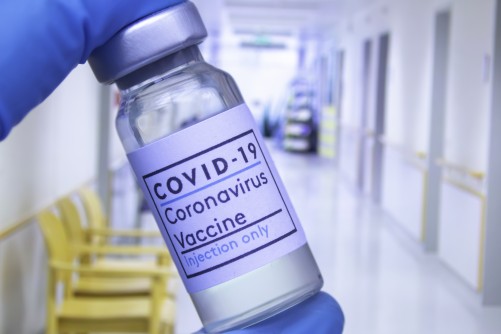A new 23-country study by a multidisciplinary team of researchers in the journal Vaccine sheds light on the factors that contribute to COVID-19 vaccine hesitancy among healthcare providers.
To assess the associations between self-reported vaccine hesitancy and a number of sociodemographic and COVID-19 vaccine perception factors, CUNY Graduate School of Public Health and Health Policy (CUNY SPH) senior scholar Jeffrey Lazarus, PhD, dean Ayman El-Mohandes, MBBCh, MD, MPH, FAAP, and colleagues from the School of Health Administration at Dalhousie University, Halifax, Canada and the Barcelona Institute for Global Health, Barcelona, Spain, developed a cross-sectional survey relating to perceptions of risk, efficacy, safety and trust, and current COVID-19 vaccine uptake.
The survey was administered to 23,000 adults in Brazil, Canada, China, Ecuador, France, Germany, Ghana, India, Italy, Kenya, Mexico, Nigeria, Peru, Poland, Russia, Singapore, South Africa, South Korea, Spain, Sweden, Turkey, the United Kingdom and the United States in June 2021. Among the respondents, 3,295 identified as healthcare providers, such as physicians, nurses and community health workers.
Responses revealed that, although most healthcare providers had received one or more doses of a COVID-19 vaccine, a substantial minority reported hesitancy. Four hundred ninety-four (15.0%) of the participants reported being reluctant to accept a COVID-19 vaccine, and 132 (4.0%) of those said they would outright refuse it.
Of the healthcare providers surveyed, physicians were the least hesitant. Vaccine hesitancy was more likely to occur among those with less than the median income and, to a lesser degree, younger age. Safety and risk concerns and lack of trust that vaccines would be equitably distributed were strongly associated with hesitancy, less so were concerns about the efficacy of COVID-19 vaccines.
Previous studies have aimed to assess the potential acceptance of a COVID-19 vaccine among healthcare providers, but few have been published since the vaccines became widely available.
“These findings are troubling,” says El-Mohandes. “Since healthcare workers’ hesitancy may influence community perceptions negatively, especially among patients and family members, and can contribute to their refusal or delayed uptake of the COVID-19 vaccine.”
“Vaccine hesitancy can impede the potential success of global vaccination campaigns, and, in turn, our ability to control the COVID-19 pandemic,” says Lazarus. “Training and campaigns reinforcing vaccine safety, dissemination of scientific data underpinning vaccine development, in addition to clear, consistent, and comprehensive information and engagement supporting the equitable distribution of vaccines are all potentially useful strategies to encourage healthcare professionals who are hesitant to vaccinate.”
The paper is titled “Factors affecting COVID-19 vaccine hesitancy among healthcare providers in 23 countries” by Jeanna Parsons Leigh, Stephana J. Moss, Trenton M. White, Camila A. Picchio, Kenneth H. Rabin, Scott C. Ratzan, Katarzyna Wyka, Ayman El-Mohandes, Jeffrey V. Lazarus (https://doi.org/10.1016/j.vaccine.2022.04.097). It appears as an Article in Press in journal Vaccine, published by Elsevier.
Source: Elsevier
